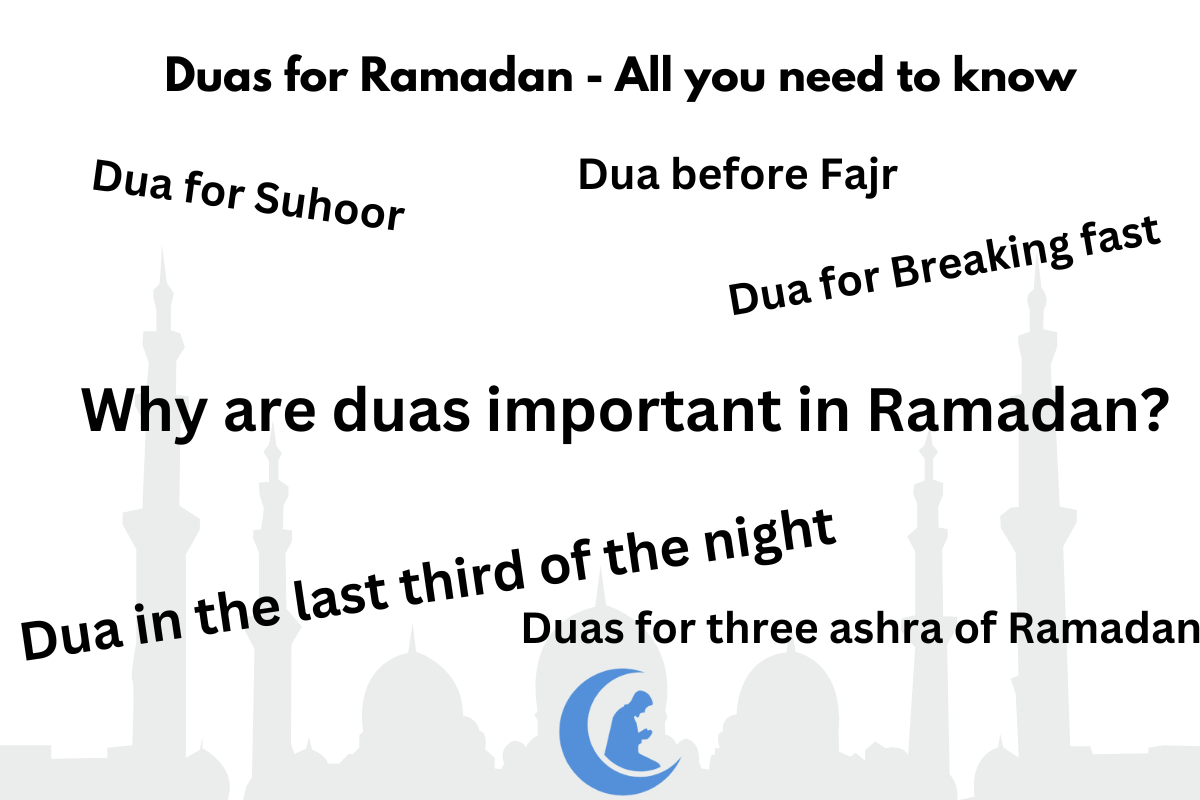Ramadan, the ninth month of the Islamic calendar and one of its four holiest is known as the month of fasting.
Muslims are obligated to fast from dawn to dusk, abstaining from food, drink, and other actions. It’s also the month when the Quran, the holy book of Islam, was first revealed to Prophet Muhammad. Muslims strive to improve their spiritual well-being throughout Ramadan by increasing acts of worship like prayer, dhikr, and reciting supplications and duas.
In anticipation of this year’s Ramadan, we’ve compiled some helpful prayers to learn in preparation.
Why are duas important in Ramadan?
Duas in Ramadan are important for every Muslim for several reasons. There are authentic hadiths about the fact that the dua of a fasting person is not rejecting, all the way to the fact that dua during fasting gives that spiritual dimension of fasting to every believer.
We’ll talk about that below.
In our previous posts, we explained why dua is important in Islam as a characteristic of every sincere believer. Raising the awareness of Muslims about the importance of dua in Islam is our main mission.
We hope that this post will bring you closer to the value of dua in Islam and the month of Ramadan, as well as everything you may not have known until now.
I hope you will share this knowledge with others.
Is Ramadan the best time for dua to be accepted?
The holy month of Ramadan is the ideal time for your duas to be accepted. In the month of Ramadan, there are several times during each day of fasting for which there are credible lectures that the supplication will be accepted.
Prophet Muhammed (pbuh) said: There are three whose supplication is never rejected: the fasting person until he breaks his fast, the just ruler, and the oppressed person.” (Sunan Ibn Majah)
Also, some traditions talk about special parts of Ramadan in which your duas have a better chance of being accepted.
Dua in the last third of the night (Dua before Fajr)
The time of the last third of the night is blessed because Allah s.w.t descends to the last sky in the last third of the night with a special intention.
In the last third of the night, Allah s.w.t. calls us to answer our duas. This window falls before Suhoor (pre-dawn meal) and the pre-dawn light in Ramadan. It’s a time when sleep is most tempting, but those who rise for prayer can expect their supplications to be received favorably.
Confirmation for this can be found in the verse of Surah Ghafir:
وَقَالَ رَبُّكُمُ ٱدْعُونِىٓ أَسْتَجِبْ لَكُمْ ۚ إِنَّ ٱلَّذِينَ يَسْتَكْبِرُونَ عَنْ عِبَادَتِى سَيَدْخُلُونَ جَهَنَّمَ دَاخِرِينَ
Your Lord has proclaimed, “Call upon Me, I will respond to you. Surely those who are too proud to worship Me will enter Hell, fully humbled.”
Ramadan dua in the last third of the night in Arabic
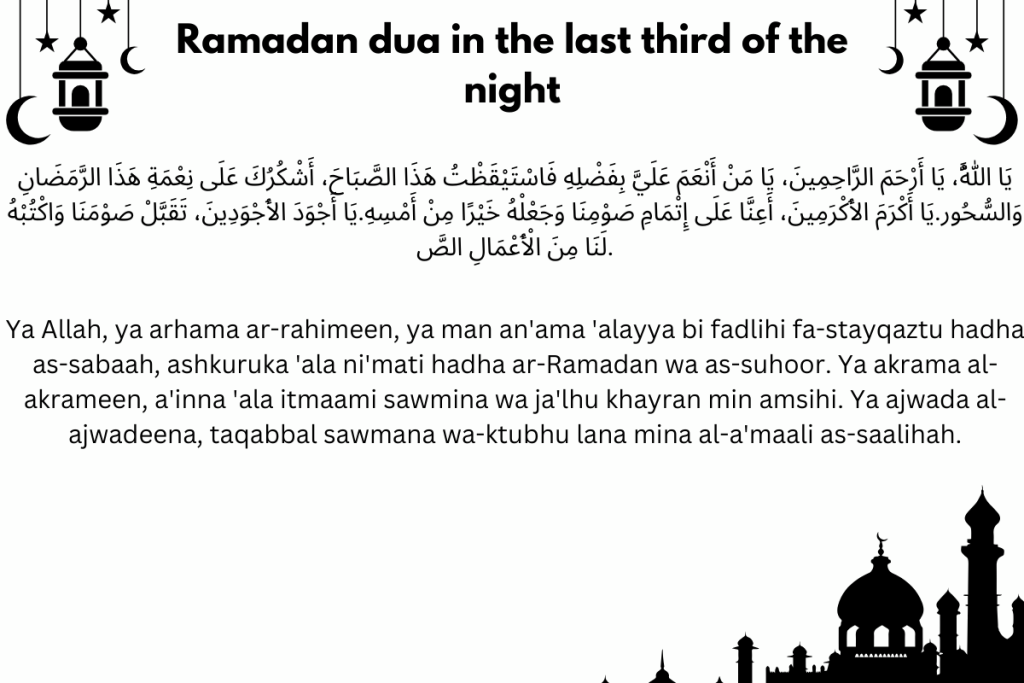
يَا اللَّهُ، يَا أَرْحَمَ الرَّاحِمِينَ، يَا مَنْ أَنْعَمَ عَلَيَّ بِفَضْلِهِ فَاسْتَيْقَظْتُ هَذَا الصَّبَاحَ، أَشْكُرُكَ عَلَى نِعْمَةِ هَذَا الرَّمَضَانِ وَالسُّحُور.يَا أَكْرَمَ الأَكْرَمِينَ، أَعِنَّا عَلَى إِتْمَامِ صَوْمِنَا وَجَعْلْهُ خَيْرًا مِنْ أَمْسِهِ.يَا أَجْوَدَ الأَجْوَدِينَ، تَقَبَّلْ صَوْمَنَا وَاكْتُبْهُ لَنَا مِنَ الْأَعْمَالِ الصَّ.
English transliteration of Ramadan dua in the last third of the night
Ya Allah, ya arhama ar-rahimeen, ya man an’ama ‘alayya bi fadlihi fa-stayqaztu hadha as-sabaah, ashkuruka ‘ala ni’mati hadha ar-Ramadan wa as-suhoor. Ya akrama al-akrameen, a’inna ‘ala itmaami sawmina wa ja’lhu khayran min amsihi. Ya ajwada al-ajwadeena, taqabbal sawmana wa-ktubhu lana mina al-a’maali as-saalihah.
Ramadan dua in the last third of the night in English
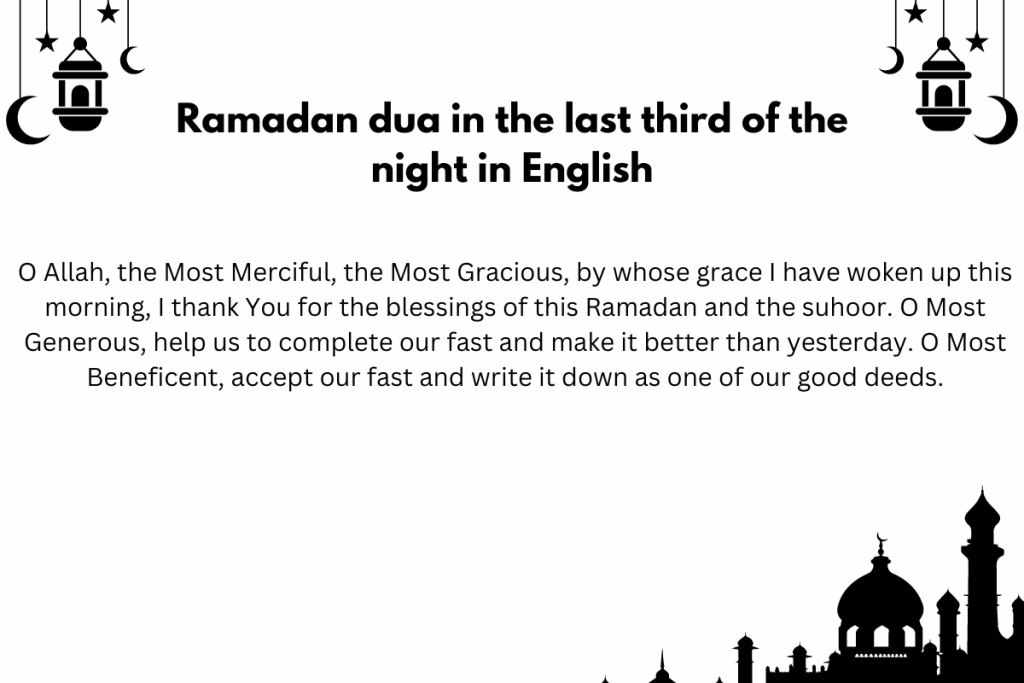
O Allah, the Most Merciful, the Most Gracious, by whose grace I have woken up this morning, I thank You for the blessings of this Ramadan and the suhoor. O Most Generous, help us to complete our fast and make it better than yesterday. O Most Beneficent, accept our fast and write it down as one of our good deeds.
Dua during Suhoor
There aren’t any specific supplications mentioned in the Quran or Sunnah specifically for Suhoor.
However, this doesn’t prevent you from reciting dua during this pre-dawn meal. Since Suhoor falls within the blessed last third of the night, it’s still an excellent time to make supplications to Allah (SWT) as He descends to the lower heaven.
You can also recite this dua any time during your fast if you seek strength for the day ahead.
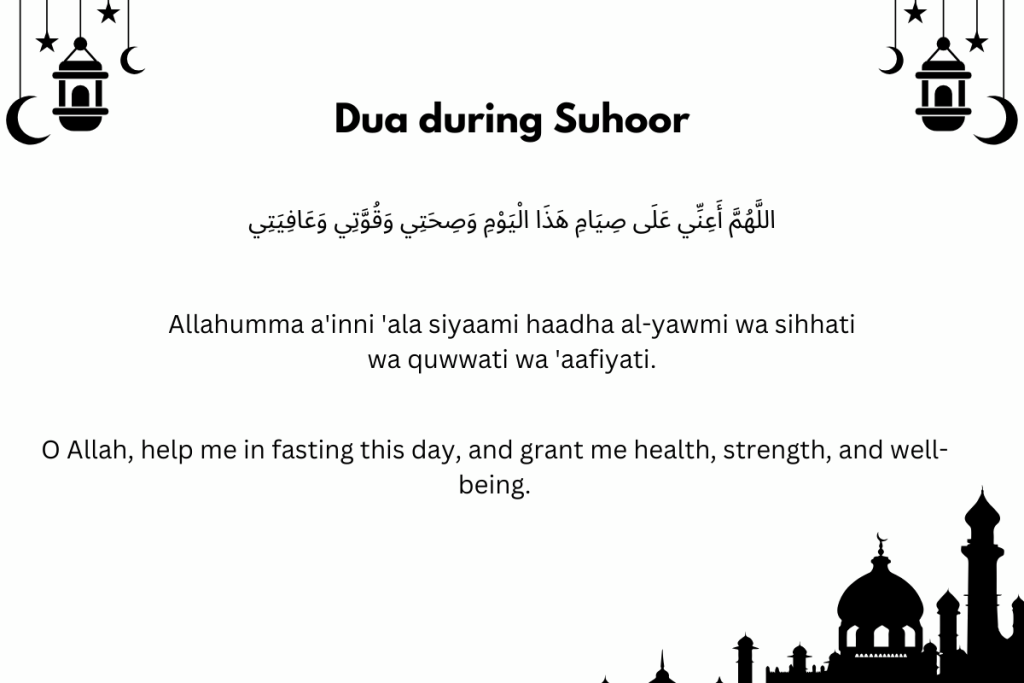
Dua during Suhoor in Arabic
اللَّهُمَّ أَعِنِّي عَلَى صِيَامِ هَذَا الْيَوْمِ وَصِحَتِي وَقُوَّتِي وَعَافِيَتِي
English Dua during Suhoor
O Allah, help me in fasting this day, and grant me health, strength, and well-being.
English transliteration of Dua during Suhoor
Allahumma a’inni ‘ala siyaami haadha al-yawmi wa sihhati wa quwwati wa ‘aafiyati.
Dua for breaking fast
The blessed time when it is recommended for the fasting person to recite dua is also the time before the iftar itself. We can say that this dua is also for breaking fast in Ramadan.
During that period, we’re occupied with iftar preparations amidst numerous distractions. It’s the final stretch of fasting when our patience wears thin.
However, making a dua at the time of iftar and before breaking the fast itself has its special weight because it proves our complete commitment to Allah s.w.t. and his provisions such as fasting. In those blessed moments of Iftar, it is important to remember that Allah s.w.t. does not reject the dua of the fasting person.
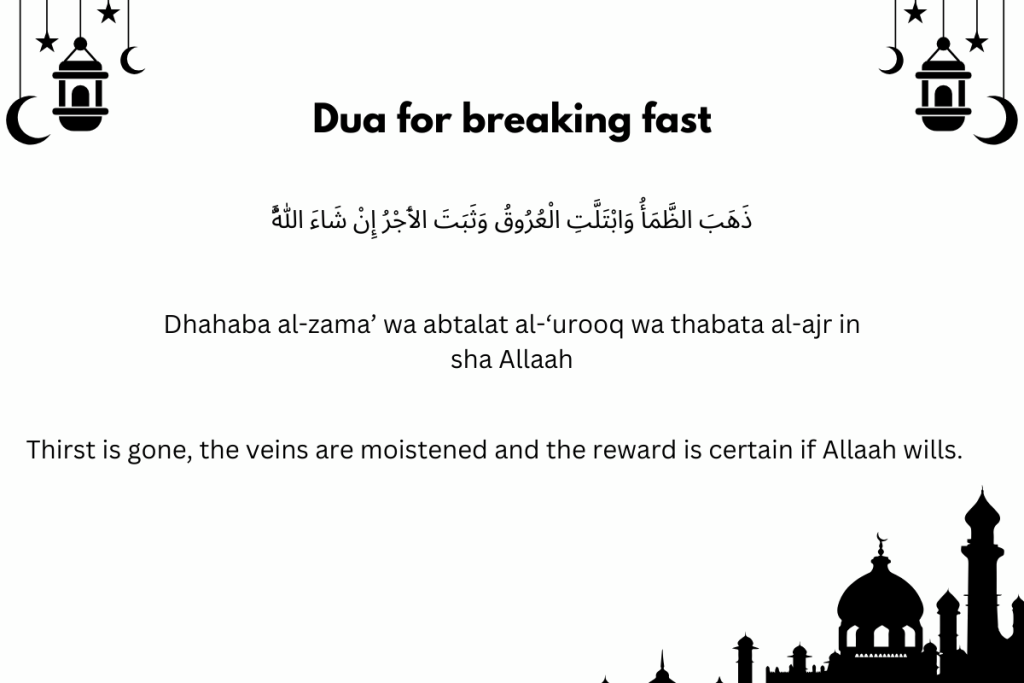
Dua for breaking fast in Arabic
ذَهَبَ الظَّمَأُ وَابْتَلَّتِ الْعُرُوقُ وَثَبَتَ الأَجْرُ إِنْ شَاءَ اللَّهُ
Dua for breaking fast in English
Thirst is gone, the veins are moistened and the reward is certain if Allaah wills.
English Transliteration of Dua for breaking fast
Dhahaba al-zama’ wa abtalat al-‘urooq wa thabata al-ajr in sha Allaah
The second Dua for breaking fast in Arabic
اللَّهُمَّ لَكَ صُمْتُ وَعَلَى رِزْقِكَ أَفْطَرْتُ
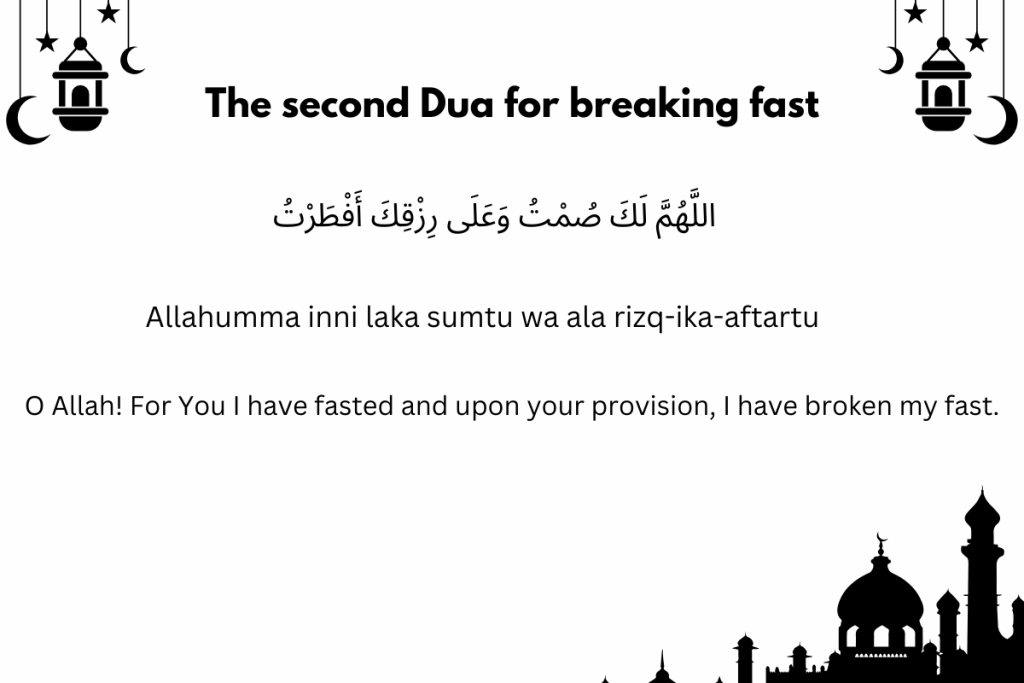
The second Dua for breaking fast in English
O Allah! For You I have fasted and upon your provision, I have broken my fast.
English Transliteration of the second Dua for breaking fast
Allahumma inni laka sumtu wa ala rizq-ika-aftartu
Duas for three ashra of Ramadan
Ramadan is divided into three units of 10 days each.
First 10 days – 1st Ashra
Second 10 days – 2nd Ashra
Last 10 days – 3rd Ashra
Each of these units for 10 days is characterized by one grace of Allah for which it is especially worth making duas. The first 10 days refer to Allah’s mercy, the second 10 days refer to Allah’s forgiveness, and the last 10 days refer to salvation from the fire.
We know this from the following hadith.
Hadith about Ramadan Ashra
Ramadan is a month whose beginning is mercy, its middle is forgiveness and its end is ransom from the Fire – Sahih Ibn Kuzejme, hadith number 1887.
However, we must emphasize that this is a weak (daif) hadith for most Islamic scholars. When a hadith is daif, it means that there are weaknesses in its chain of narrators that characterize it as weak. This is why most Islamic scholars do not recognize or recommend it.
Islamic scholars who quote this hadith and who talk about these three parts of Ramadan do so with the desire to encourage Muslims to take advantage of the opportunity of Ramadan and increase the number of their duas and prayers.
There are also no hadiths that state the duas to be recited in these three parts of Ramadan.
In addition to not being found in hadiths, certain duas in Islamic teaching are suggested to be recited during the blessed month of Ramadan.
Because of that, we will list them in a separate post so that they are in one place, but still separated.
Finally, we hope that, together with us, you will take advantage of the opportunity that Ramadan provides as a holy month for Muslims and that you will increase your prayers and duas to Allah s.w.t.
We ask Almighty Allah to make it easy for you, who are asking for supplications to ask for help from the One who provides help, to fast in the month of Ramadan as well as to accept your supplications.
Don’t forget us in your prayers.

